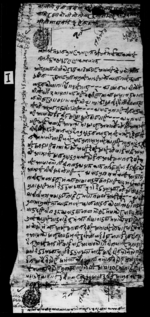A letter of Jītajaṅga Bahādura Rāṇā restraining a local revenue official from collecting revenue on Tripurasundarī guṭhī lands in Jumla (VS 1936)
ID: K_0093_0002I
Edited and
translated by Ramhari Timalsina
in collaboration with
Pabitra Bajracharya
Created: 2021-03-24;
Last modified: 2021-07-09
For the metadata of the document, click here
The accompanying edition, translation/synopsis and/or commentary are available under the terms of the Creative Commons Attribution-ShareAlike 4.0 International License
Abstract
This is a letter from Eastern Commanding General Jītajaṅga Bahādura Rāṇā to a local contractor (amālī) regarding revenue collection from guṭhī lands that were supporting a Tripurasundarī temple. The local priests Sarmānaṃda Upādhyā and Purṇānaṃda Upādhyā had claimed that customarily they had been collecting revenue on land in Lātāchriṃ Gallī village to cover general expenditures for the temple, but that the local amālī had started claiming that revenue. The amālī is told to revert to the former arrangement or else justify himself.Diplomatic edition
[1r]
1⟪१नं⟫[Unknown seal]1स्वस्तीश्रीमद्राज∙कुमार∙कुमारात्मश्रीपुर्वतर्फकाकम्यांडी2जीतजंङ्ग∙वहादुर∙राणाकस्यपत्रम¯¯¯ ¯¯¯ ¯¯¯ ¯¯¯ ¯¯¯ ¯¯¯ ¯¯¯ ¯¯¯
3आगेजुमलातीप्रीकोट्दरा∙काठेक्कदार∙अमालीकेय़थोचीत
4उप्रांत¯ ¯१¯कापाटपुजामामुली∙मादरीयाकोव्यासतलीफाल
5लाउन∙कोलाताछ्रिंगल्लीगाउ∙¯ ¯१¯कास्थानमानीत्येनै
6मीत्ये∙दसै२मापुजापाटगरी∙दक्षीणाषान्या∙हाम्रानाउमाला
7ल∙मोहर∙हुदाढडामापनी∙मीन्हाभय़ाकोउठतीरुपैञाँनीजवाटहा
8मी∙ले∙असुलतहसीलगरी¯ ¯१¯कापाटपुजागरी∙नीजगाउमा
9परीआय़ाकोडंडकुंड∙हाम्राहातवाट∙गरी¯ ¯१¯कापुजापाट
10गरी∙षाईचलाई∙आय़ाकोमाहाल्∙अमाली∙लेसोआम्दानी
11तीमीलेहरुले∙षानपाउदैनवुझाउनल्याउ∙भनीपक्रीरहेछनी
12ज∙अमालीलाई∙पनीपाटपुजामामुलीकागुठीगाउवाहेकरा
13षीसनदगरीवस्याकोहो∙अघीदेषीहामीले∙षाईपाईआय़ा
14को∙आम्दानीहालवुझाउनुपर्न्या∙होईन∙अघीसनातनदेषीच
15ली : आय़ावमोजींनीजगाउकादामकामतर्तहसीलदंडकुंडको
16आम्दानीतीमीहरुलेगरी¯ ¯१¯कापाटपुजाषर्चचलीआय़ामु
17तावीक∙चलाउनु∙भंन्या∙हाम्रानाउमासनदगरीपाउभनीथानी
18पुजाहारीसर्मानंदउपाध्या∙पुर्नानंदउपाध्या∙ले∙हाम्राहजुर
19मावीन्तीपत्रचढाउदा∙जाहेरभय़ोतसर्थअघीदेषी¯ ¯१¯कापाट
20पुजामामुलीमाव्यासतलीफाललाउनकोलाताछ्रींगल्ली
21गाउ∙दरी∙नीजहरुकानाउमालालमोहरभय़ाकोरपाटपुजामा
22 मुलीकागुठीगाउवाहेकभंन्या∙तीम्रानाउमाभय़ाकोपट्टास्मेत्
23साचोहोभंन्या∙अघीसनातनदेषीअमालीलेषाईपाईचर्ची
24नआय़ाकोछाल्लाग्छभनीदुनीञाँलाईठंडालगाईदुषदीनहु
25दैनअघीसनदभैषाई∙पाईआय़ावमोजिंनीजथानीपुजाहारी
26सर्मानंदउपाध्या∙पुर्णानंदउपाध्यालाईछाडीदीनुय़ोवेहोराहो
27ईन∙आर्कैवेहोरा∙छभन्याअैंनसव़ालवमोजींवेहोराप्रमाणवु
28झीभय़ाकावेहोराषुलस्त∙गरीलेषीहाम्राहजुरमाजाहेरगरी
29पठाउनेकामगर्नुईतीसंम्वत्१९३६सालदुतीयेआसुनवदी३०
30रोज४शुभं¯¯¯ ¯¯¯ ¯¯¯ ¯¯¯ ¯¯¯ ¯¯¯ ¯¯¯ ¯¯¯1सक्कलवमोजींनक्कलदुरुस्तछभनीस्हीछापगर्नेथानीभानुभक्तपाध्यातीपृकोट्¯¯¯ ¯¯¯ ¯¯¯ ¯¯¯ ¯¯¯ ¯¯¯ ¯¯¯ ¯¯¯1स्हीभानुभगतउपा
2ध्याकोट्गाउ1[?]
2सकलवमोजीं1[?]पतेज1रुजु
2स्हीनौहरी
3स्हीमोहं
Translation
[1r]
No. 1 1
Unknown seal
Hail! A letter of the venerable prince, son of a prince, Eastern Commanding General Jītajaṅga Bahādura Rāṇā
Age: To the amālī, holder of a revenue-collecting contract for the Tīprīkoṭ subdivision of Jumla
Yathocita uprānta: The following became known [to us] when the local priests of good standing Sarmānaṃda Upādhyā and Purṇānaṃda Upādhyā petitioned us, stating: "Lātāchriṃ Gallī village of Vyāsatalī Phālalāuna is registered [as a revenue source] for the general expenditures for performing recitations and worship of -1- (i.e. glorious Tripurasundarī2 ), and after a lālamohara was issued in our names [allowing us] to perform the daily and occasional rituals and to perform worship and recitations during the two daśaĩs at the shrine of -1- (i.e. glorious Tripurasundarī) there and to enjoy the [corresponding] ritual fees (dakṣiṇā), we received the revenue, and also were granted compensation [for shortfalls] in the accounting. We received the revenue through the said [amālī], collected with our own hands judicial fines (daṇḍakuṇḍa) imposed upon the aforementioned village [in connection with our] performing the rituals of -1- (i.e. glorious Tripurasundarī), and were [in general] conducting the rituals and enjoying [the surplus]. The amālī has now been seizing [our revenue], telling us that we are not entitled to enjoy the revenue, and that we must hand it over to him. A sanada had been issued to the amālī, too, that barred him [from keeping such revenue] from the guṭhī and village as is [allocated] for the usual ritual worship. We are now not obliged to hand over revenue that we have been enjoying since earlier times. We request that you issue a sanada stating: 'Following the customary tradition, receive income from monetary transactions (dāmakāma), the collection of various revenue (tartahasīla) and judicial fines (daṇḍakuṇḍa), and bear the cost of ritual worship at -1- (i.e. glorious Tripurasundarī) as before in accordance with what has come down since olden times'."
Therefore, if it is true that Lātāchriṃ Gallī village of Vyāsatalī Phālalāuna is registered [as a revenue source] for the general expenditures for the recitation and worship of -1- (i.e. glorious Tripurasundarī), and a lālamohara also has been issued in their name, while a paṭṭā issued in your name excludes the guṭhī[-lands of] the village specified for the general expenditures for the recitation and worship, do not trouble or harass the people by now saying that [payments] which amālīs have not been receiving and enjoying since olden times are now being imposed; leave to Sarmānaṃda Upādhyā and Purṇānaṃda Upādhyā [the revenue] that they have previously been enjoying in accordance with the sanada. If this is not the case and there are other details, gather the evidence for the details in accordance with the Ain and savālas and send them [to us] to inform us of them.
Wednesday, the second day of the dark fortnight and the 30th day of Āśvina, in the [Vikrama] era year 1936 (1879 CE). Auspiciousness.
Attesting that the copy is in accordance with the original:
ThānīBhānubhakta Pādhyā, [a resident of] Tīpṛkoṭ
Signature: Bhānubhagata Upādhyā, Koṭ village
In accordance with the original
{Unclear}
Reviewers:
Signature [of] Nau[sindā]Harī
Signature [of] Mohaṃ
Commentary
For more information about the temple of Tripurasundarī, see the Commentary of K_0093_0002C.

